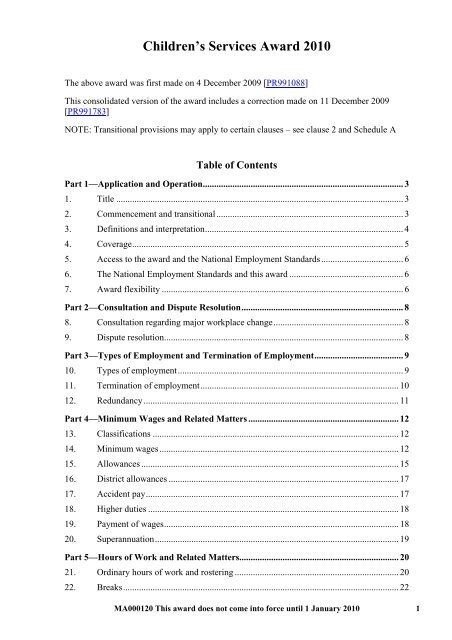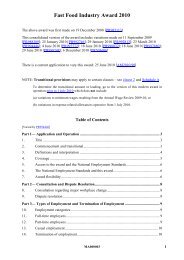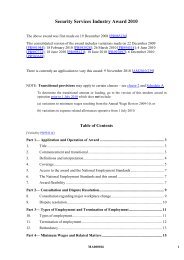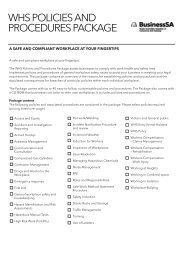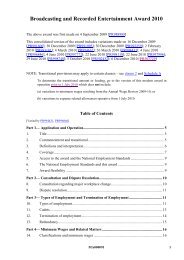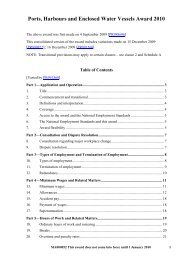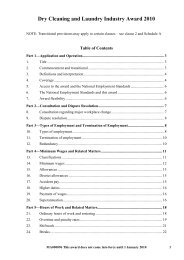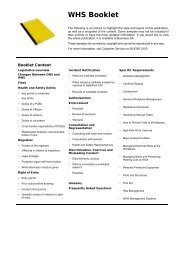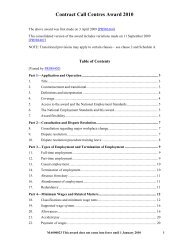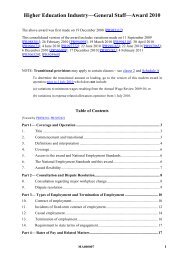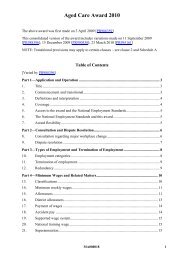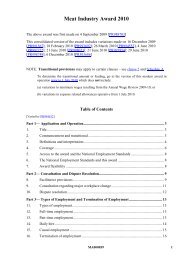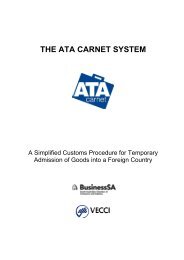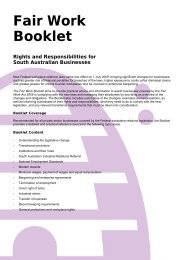Children's Services Award 2010 - Business SA
Children's Services Award 2010 - Business SA
Children's Services Award 2010 - Business SA
You also want an ePaper? Increase the reach of your titles
YUMPU automatically turns print PDFs into web optimized ePapers that Google loves.
Children’s <strong>Services</strong> <strong>Award</strong> <strong>2010</strong>Part 1—Application and Operation1. TitleThis award is the Children’s <strong>Services</strong> <strong>Award</strong> <strong>2010</strong>.2. Commencement and transitional2.1 This award commences on 1 January <strong>2010</strong>.2.2 The monetary obligations imposed on employers by this award may be absorbed intooveraward payments. Nothing in this award requires an employer to maintain orincrease any overaward payment.2.3 This award contains transitional arrangements which specify when particular parts ofthe award come into effect. Some of the transitional arrangements are in clauses inthe main part of the award. There are also transitional arrangements in Schedule A.The arrangements in Schedule A deal with:• minimum wages and piecework rates• casual or part-time loadings• Saturday, Sunday, public holiday, evening or other penalties• shift allowances/penalties.2.4 Neither the making of this award nor the operation of any transitional arrangementsis intended to result in a reduction in the take-home pay of employees covered by theaward. On application by or on behalf of an employee who suffers a reduction intake-home pay as a result of the making of this award or the operation of anytransitional arrangements, Fair Work Australia may make any order it considersappropriate to remedy the situation.2.5 Fair Work Australia may review the transitional arrangements in this award andmake a determination varying the award.2.6 Fair Work Australia may review the transitional arrangements:(a)(b)(c)(d)on its own initiative; oron application by an employer, employee, organisation or outworker entitycovered by the modern award; oron application by an organisation that is entitled to represent the industrialinterests of one or more employers or employees that are covered by themodern award; orin relation to outworker arrangements, on application by an organisation that isentitled to represent the industrial interests of one or more outworkers to whomthe arrangements relate.MA000120 This award does not come into force until 1 January <strong>2010</strong> 3
Children’s <strong>Services</strong> <strong>Award</strong> <strong>2010</strong>(a)(b)be confined to a variation in the application of one or more of the terms listedin clause 7.1; andresult in the employee being better off overall than the employee would havebeen if no individual flexibility agreement had been agreed to.7.4 The agreement between the employer and the individual employee must also:(a)(b)(c)(d)(e)be in writing, name the parties to the agreement and be signed by the employerand the individual employee and, if the employee is under 18 years of age, theemployee’s parent or guardian;state each term of this award that the employer and the individual employeehave agreed to vary;detail how the application of each term has been varied by agreement betweenthe employer and the individual employee;detail how the agreement results in the individual employee being better offoverall in relation to the individual employee’s terms and conditions ofemployment; andstate the date the agreement commences to operate.7.5 The employer must give the individual employee a copy of the agreement and keepthe agreement as a time and wages record.7.6 Except as provided in clause 7.4(a) the agreement must not require the approval orconsent of a person other than the employer and the individual employee.7.7 An employer seeking to enter into an agreement must provide a written proposal tothe employee. Where the employee’s understanding of written English is limited theemployer must take measures, including translation into an appropriate language, toensure the employee understands the proposal.7.8 The agreement may be terminated:(a)(b)by the employer or the individual employee giving four weeks’ notice oftermination, in writing, to the other party and the agreement ceasing to operateat the end of the notice period; orat any time, by written agreement between the employer and the individualemployee.7.9 The right to make an agreement pursuant to this clause is in addition to, and is notintended to otherwise affect, any provision for an agreement between an employerand an individual employee contained in any other term of this award.MA000120 This award does not come into force until 1 January <strong>2010</strong> 7
Children’s <strong>Services</strong> <strong>Award</strong> <strong>2010</strong>Part 2—Consultation and Dispute Resolution8. Consultation regarding major workplace change8.1 Employer to notify(a)(b)Where an employer has made a definite decision to introduce major changes inproduction, program, organisation, structure or technology that are likely tohave significant effects on employees, the employer must notify the employeeswho may be affected by the proposed changes and their representatives, if any.Significant effects include termination of employment; major changes in thecomposition, operation or size of the employer’s workforce or in the skillsrequired; the elimination or diminution of job opportunities, promotionopportunities or job tenure; the alteration of hours of work; the need forretraining or transfer of employees to other work or locations; and therestructuring of jobs. Provided that where this award makes provision foralteration of any of these matters an alteration is deemed not to have significanteffect.8.2 Employer to discuss change(a)(b)(c)The employer must discuss with the employees affected and theirrepresentatives, if any, the introduction of the changes referred to in clause 8.1,the effects the changes are likely to have on employees and measures to avertor mitigate the adverse effects of such changes on employees and must giveprompt consideration to matters raised by the employees and/or theirrepresentatives in relation to the changes.The discussions must commence as early as practicable after a definite decisionhas been made by the employer to make the changes referred to in clause 8.1.For the purposes of such discussion, the employer must provide in writing tothe employees concerned and their representatives, if any, all relevantinformation about the changes including the nature of the changes proposed,the expected effects of the changes on employees and any other matters likelyto affect employees provided that no employer is required to discloseconfidential information the disclosure of which would be contrary to theemployer’s interests.9. Dispute resolution9.1 In the event of a dispute about a matter under this award, or a dispute in relation tothe NES, in the first instance the parties must attempt to resolve the matter at theworkplace by discussions between the employee or employees concerned and therelevant supervisor. If such discussions do not resolve the dispute, the parties willendeavour to resolve the dispute in a timely manner by discussions between theemployee or employees concerned and more senior levels of management asappropriate.8 MA000120 This award does not come into force until 1 January <strong>2010</strong>
Children’s <strong>Services</strong> <strong>Award</strong> <strong>2010</strong>9.2 If a dispute about a matter arising under this award or a dispute in relation to the NESis unable to be resolved at the workplace, and all appropriate steps under clause 9.1have been taken, a party to the dispute may refer the dispute to Fair Work Australia.9.3 The parties may agree on the process to be utilised by Fair Work Australia includingmediation, conciliation and consent arbitration.9.4 Where the matter in dispute remains unresolved, Fair Work Australia may exerciseany method of dispute resolution permitted by the Act that it considers appropriate toensure the settlement of the dispute.9.5 An employer or employee may appoint another person, organisation or association toaccompany and/or represent them for the purposes of this clause.9.6 While the dispute resolution procedure is being conducted, work must continue inaccordance with this award and the Act. Subject to applicable occupational healthand safety legislation, an employee must not unreasonably fail to comply with adirection by the employer to perform work, whether at the same or anotherworkplace, that is safe and appropriate for the employee to perform.Part 3—Types of Employment and Termination of Employment10. Types of employment10.1 Employees under this award will be employed in one of the following categories:(a)(b)(c)full-time;part-time; orcasual.10.2 At the time of engagement an employer will inform each employee of the terms oftheir engagement and in particular whether they are to be full-time, part-time orcasual.10.3 Full-time employmentA full-time employee is an employee who is engaged to work an average of38 ordinary hours per week.10.4 Part-time employment(a)(b)An employer may employ a part-time employee in any classification in thisaward.A part-time employee is an employee who:(i)(ii)works less than full-time hours of 38 per week;has reasonably predictable hours of work; and(iii) receives, on a pro rata basis, equivalent pay and conditions to those offull-time employees who do the same kind of work.MA000120 This award does not come into force until 1 January <strong>2010</strong> 9
Children’s <strong>Services</strong> <strong>Award</strong> <strong>2010</strong>(c)(d)(e)(f)(g)At the time of engagement the employer and the part-time employee will agreein writing on a regular pattern of work, specifying at least the hours workedeach day, which days of the week the employee will work and the actualstarting and finishing times each day.Changes in hours of work may only be made by agreement in writing betweenthe employer and employee. Changes in the days to be worked can be made bythe employer giving seven days notice in advance of the change in accordancewith clause 21—Ordinary hours of work and rostering.An employer is required to roster a part-time employee for a minimum of twoconsecutive hours on any shift.A part-time employee who agrees to work in excess of their normal hours willbe paid at ordinary time for up to eight hours provided that the additional timeworked is during the ordinary hours of operation of the early childhood service.No part-time employee may work in excess of eight hours in any day withoutthe payment of overtime paid for at the rates prescribed in clause 23—Overtime and penalty rates.A part-time employee employed under the provisions of this clause must bepaid for the ordinary hours worked at the rate of 1/38th of the weekly rateprescribed in clause 14—Minimum wages.10.5 Casual employment(a)(b)(c)(d)(e)A casual employee is an employee engaged as such and must be paid thehourly rate payable for a full-time employee for the relevant classification inclause 14—Minimum wages plus a casual loading of 25%.A casual employee is one engaged for temporary and relief purposes.A casual employee will be paid a minimum of two hours pay for eachengagement.A casual employee may, by mutual agreement, be paid weekly or at thetermination of each engagement.For work in excess of eight hours on any one day or shift or 38 hours in anyone week, a casual employee will be paid in accordance with the penaltiesspecified in clause 23—Overtime and penalty rates.11. Termination of employment11.1 Notice of termination is provided for in the NES.11.2 Notice of termination by an employeeThe notice of termination required to be given by an employee is the same as thatrequired of an employer except that there is no requirement on the employee to giveadditional notice based on the age of the employee concerned. If an employee fails togive the required notice the employer may withhold from any monies due to theemployee on termination under this award or the NES, an amount not exceeding theamount the employee would have been paid under this award in respect of the period10 MA000120 This award does not come into force until 1 January <strong>2010</strong>
Children’s <strong>Services</strong> <strong>Award</strong> <strong>2010</strong>of notice required by this clause less any period of notice actually given by theemployee.11.3 Job search entitlementWhere an employer has given notice of termination to an employee, an employeemust be allowed up to one day’s time off without loss of pay for the purpose ofseeking other employment. The time off is to be taken at times that are convenient tothe employee after consultation with the employer.12. Redundancy12.1 Redundancy pay is provided for in the NES.12.2 Transfer to lower paid dutiesWhere an employee is transferred to lower paid duties by reason of redundancy, thesame period of notice must be given as the employee would have been entitled to ifthe employment had been terminated and the employer may, at the employer’soption, make payment instead of an amount equal to the difference between theformer ordinary time rate of pay and the ordinary time rate of pay for the number ofweeks of notice still owing.12.3 Employee leaving during notice periodAn employee given notice of termination in circumstances of redundancy mayterminate their employment during the period of notice. The employee is entitled toreceive the benefits and payments they would have received under this clause hadthey remained in employment until the expiry of the notice, but is not entitled topayment instead of notice.12.4 Job search entitlement(a)(b)An employee given notice of termination in circumstances of redundancy mustbe allowed up to one day’s time off without loss of pay during each week ofnotice for the purpose of seeking other employment.If the employee has been allowed paid leave for more than one day during thenotice period for the purpose of seeking other employment, the employee must,at the request of the employer, produce proof of attendance at an interview orthey will not be entitled to payment for the time absent. For this purpose astatutory declaration is sufficient.(c) This entitlement applies instead of clause 11.3.12.5 Transitional provisions(a)Subject to clause 12.5(b), an employee whose employment is terminated by anemployer is entitled to redundancy pay in accordance with the terms of anotional agreement preserving a State award:(i)that would have applied to the employee immediately prior to 1 January<strong>2010</strong>, if the employee had at that time been in their current circumstancesof employment and no agreement-based transitional instrument orenterprise agreement had applied to the employee; andMA000120 This award does not come into force until 1 January <strong>2010</strong> 11
Children’s <strong>Services</strong> <strong>Award</strong> <strong>2010</strong>(ii)that would have entitled the employee to redundancy pay in excess of theemployee’s entitlement to redundancy pay, if any, under the NES.(b)(c)The employee’s entitlement to redundancy pay under the notional agreementpreserving a State award is limited to the amount of redundancy pay whichexceeds the employee’s entitlement to redundancy pay, if any, under the NES.This clause does not operate to diminish an employee’s entitlement toredundancy pay under any other instrument.(d) Clause 12.5 ceases to operate on 31 December 2014.Part 4—Minimum Wages and Related Matters13. Classifications13.1 The definitions of the classification levels in clause 14—Minimum wages arecontained in Schedule B—Classification Structure.14. Minimum wages14.1 The total minimum weekly rate of wages payable to persons employed pursuant tothis award will be as set out in the following table.ClassificationMinimum weeklyrate12 MA000120 This award does not come into force until 1 January <strong>2010</strong>Minimum hourlyrate$ $Support WorkerLevel 1.1 On commencement 557.00 14.66Level 2.1 On commencement 579.30 15.24Level 2.2 After 1 year* 600.20 15.79Level 3.1 On commencement 637.64 16.78Children’s <strong>Services</strong>EmployeeLevel 1.1 On commencement 557.00 14.66Level 2.1 On commencement 579.30 15.24Level 2.2 After 1 year* 600.20 15.79Level 3A.1** On commencement 627.38 16.51Level 3A.2** After 1 year 637.64 16.78Level 3.1 On commencement 637.64 16.78Level 3.2 After 1 year* 660.44 17.38Level 3.3 After 2 years* 682.10 17.95Level 3.4 (Diploma) 721.24 18.98Level 4A.1 On commencement 682.10 17.95
ClassificationChildren’s <strong>Services</strong> <strong>Award</strong> <strong>2010</strong>Minimum weeklyrateMinimum hourlyrate$ $Level 4A.2 After 1 year* 691.98 18.21Level 4A.3 After 2 years* 701.86 18.47Level 4A.4 After 3 years* 712.12 18.74Level 4A.5 After 4 years* 722.00 19.00Level 4.1 On commencement 755.82 19.89Level 4.2 After 1 year* 767.60 20.20Level 4.3 After 2 years* 779.38 20.51Level 5A.1 On commencement 791.54 20.83Level 5A.2 After 1 year* 803.32 21.14Level 5A.3 After 2 years* 815.10 21.45Level 5.1 On commencement 791.54 20.83Level 5.2 After 1 year* 803.32 21.14Level 5.3 After 2 years* 815.10 21.45Level 5.4*** 818.14 21.53Level 6A.1 On commencement 916.56 24.12Level 6A.2 After 1 year* 928.34 24.43Level 6A.3 After 2 years* 940.12 24.74Children’s <strong>Services</strong>Employee—DirectorLevel 6.1 On commencement 916.56 24.12Level 6.2 After 1 year* 928.34 24.43Level 6.3 After 2 years* 940.12 24.74Level 6.4 On commencement 976.22 25.69Level 6.5 After 1 year* 985.34 25.93Level 6.6 After 2 years* 997.50 26.25Level 6.7 On commencement 1009.66 26.57Level 6.8 After 1 year * 1021.44 26.88Level 6.9 After 2 years* 1033.22 27.19*Reference to a year or years of service is to service in the industry**Former Western Australian ‘E’ worker classification***An Assistant Director who holds an Advanced Diploma (AQF 6/3 year qualified)must be paid no less than Level 5.4MA000120 This award does not come into force until 1 January <strong>2010</strong> 13
Children’s <strong>Services</strong> <strong>Award</strong> <strong>2010</strong>14.2 Progression for children’s services employees(a)Progression from one level to the next within a classification is subject to anemployee meeting the following criteria:(i)(ii)competency at the existing level;12 months experience at that level (or in the case of employees employedfor 19 hours or less per week, 24 months) and in-service training asrequired; and(iii) demonstrated ability to acquire the skills necessary for advancement tothe next pay point.(b)Where an employee is deemed not to have met the requisite competency attheir existing level at the time of the appraisal, progression may be deferred fora period of three months provided that:(i)(ii)the employee is notified in writing of the reasons for the deferral;the employee has, in the previous 12 months, been provided with thein-service training required to attain a higher pay point; and(iii) following any deferral, the employee is provided with the trainingnecessary to advance to the next level.(c)(d)Where an appraisal has been deferred for operational reasons beyond thecontrol of either party and the appraisal subsequently deems the employee tohave met the requirements of clause 14.2(a), any increase in wages will beback paid to the 12 (or 24) month anniversary date of the previous progression.An employee whose progression has been refused or deferred may invoke theprovisions of clause 9—Dispute resolution. If the resolution results in theadvancement being granted, any increase in wages will be backdated to therelevant anniversary date.(e)14.3 Junior employeesAn employee employed as a Children’s <strong>Services</strong> Employee Level 2 oncompletion of an accredited introductory childcare course will immediatelyprogress by one additional level beyond that determined in accordance withclause 14.2(a). Any additional steps will be subject to meeting the requirementsof clause 14.2(a).(a) Junior employees employed as Children’s <strong>Services</strong> Employees Level 3, 4 and 5must be paid at the appropriate adult rate.(b)Junior employees employed as Children’s <strong>Services</strong> Employee Level 1 orChildren’s <strong>Services</strong> Employee Level 2 will be paid no less than the followingpercentages of the corresponding Children’s <strong>Services</strong> Employee Level 2 rate:Age% of adult rateUnder 17 years 70Under 18 years 80Under 19 years 9014 MA000120 This award does not come into force until 1 January <strong>2010</strong>
Age14.4 ApprenticesChildren’s <strong>Services</strong> <strong>Award</strong> <strong>2010</strong>% of adult rateUnder 20 years 100Apprentices will be engaged in accordance with the relevant apprenticeshiplegislation and paid no less than an unapprenticed junior of the same age.14.5 Supported wage systemSee Schedule C14.6 National training wageSee Schedule D15. Allowances15.1 Broken shift allowanceWhere an employee works two separate shifts in a day, they will be paid anallowance of 1.91% of the standard rate per day for each day on which a broken shiftis worked.15.2 Clothing and equipment allowance(a)(b)(c)Where the employer requires an employee to wear any special clothing orarticles of clothing the employer must reimburse the employee for the cost ofpurchasing such clothing. The provisions of this clause do not apply where theemployer pays for the clothing required to be worn by the employee.Where an employee is required to launder any clothing referred to inclause 15.2(a) the employee will be paid an allowance of $9.49 per week or$1.90 per day, or where the uniform does not require ironing, $5.98 per weekor $1.20 per day.Where an employee is required to wear protective clothing or equipment suchas goggles, aprons or gloves, the employer will either supply such clothing orequipment or reimburse the employee for the cost of their purchase.15.3 Excess fares allowanceWhere an employee is directed to work away from their normal place of work on anyday the employee will be paid an allowance of $12.67 per day to compensate forexcess fares. This provision does not apply if the employer provides or offers toprovide suitable transport free of charge to the employee.15.4 First aid allowance(a)Where an employee classified at Level 3 or below is required by the employerto administer first aid to children within the employee’s care and the employeeholds a current recognised first aid qualification such as a certificate from theSt John Ambulance, the Australian Red Cross or a similar body they will bepaid an allowance of 1.13% of the standard rate per day. Where the employeeMA000120 This award does not come into force until 1 January <strong>2010</strong> 15
Children’s <strong>Services</strong> <strong>Award</strong> <strong>2010</strong>is employed in out-of-school hours care, the allowance will be 0.15% of thestandard rate per hour.(b)(c)Provided that a first aid officer need not be appointed where a qualified nurse ison the premises at all times.Where an employee is required by an employer to act as a first aid officer andthey do not have current qualifications, the employer must pay the costs of anyrequired training.15.5 Meal allowanceAn employee required to work overtime for more than two hours without beingnotified on the previous day or earlier that they will be so required to work will eitherbe supplied with a meal by the employer or paid an allowance of $9.32. No mealallowance is payable where an employee could reasonably return home for a mealwithin the period allowed.15.6 Qualifications allowanceA Director or Assistant Director who holds a Graduate Certificate in ChildcareManagement or equivalent will be paid an all-purpose allowance, calculated at 5% ofthe weekly rate for an Assistant Director (Children’s <strong>Services</strong> Employee Level 5.4).15.7 Use of vehicle allowanceWhere an employer requests an employee to use their own motor vehicle in theperformance of their duties the employee will be paid an allowance of $0.74 perkilometre in the case of a motor car or $0.25 per kilometre in the case of amotorcycle.15.8 Adjustment of expense related allowances(a)(b)At the time of any adjustment to the standard rate, each expense relatedallowance will be increased by the relevant adjustment factor. The relevantadjustment factor for this purpose is the percentage movement in the applicableindex figure most recently published by the Australian Bureau of Statisticssince the allowance was last adjusted.The applicable index figure is the index figure published by the AustralianBureau of Statistics for the Eight Capitals Consumer Price Index (Cat No.6401.0), as follows:AllowanceApplicable Consumer Price Index figureClothing and equipment Clothing and footwear groupallowanceExcess fares allowanceMeal allowanceVehicle allowanceTransportation groupTake away and fast foods sub-groupPrivate motoring sub-group16 MA000120 This award does not come into force until 1 January <strong>2010</strong>
Children’s <strong>Services</strong> <strong>Award</strong> <strong>2010</strong>16. District allowances16.1 Northern TerritoryAn employee in the Northern Territory is entitled to payment of a district allowancein accordance with the terms of an award made under the Workplace Relations Act1996 (Cth):(a) that would have applied to the employee immediately prior to 1 January <strong>2010</strong>,if the employee had at that time been in their current circumstances ofemployment and no agreement-based transitional instrument or enterpriseagreement had applied to the employee; and(b)that would have entitled the employee to payment of a district allowance.16.2 Western AustraliaAn employee in Western Australia is entitled to payment of a district allowance inaccordance with the terms of a notional agreement preserving a State award or anaward made under the Workplace Relations Act 1996 (Cth):(a) that would have applied to the employee immediately prior to 1 January <strong>2010</strong>,if the employee had at that time been in their current circumstances ofemployment and no agreement-based transitional instrument or enterpriseagreement had applied to the employee; and(b)that would have entitled the employee to payment of a district allowance.16.3 This clause ceases to operate on 31 December 2014.17. Accident pay17.1 Subject to clause 17.2, an employee is entitled to accident pay in accordance with theterms of:(a)(b)a notional agreement preserving a State award that would have applied to theemployee immediately prior to 1 January <strong>2010</strong> or an award made under theWorkplace Relations Act 1996 (Cth) that would have applied to the employeeimmediately prior to 27 March 2006, if the employee had at that time been intheir current circumstances of employment and no agreement-based transitionalinstrument or enterprise agreement had applied to the employee; andthat would have entitled the employee to accident pay in excess of theemployee’s entitlement to accident pay, if any, under any other instrument.17.2 The employee’s entitlement to accident pay under the notional agreement preservinga State award or the award is limited to the amount of accident pay which exceedsthe employee’s entitlement to accident pay, if any, under any other instrument.17.3 This clause does not operate to diminish an employee’s entitlement to accident payunder any other instrument.17.4 This clause ceases to operate on 31 December 2014.MA000120 This award does not come into force until 1 January <strong>2010</strong> 17
Children’s <strong>Services</strong> <strong>Award</strong> <strong>2010</strong>18. Higher duties18.1 An employee engaged in duties carrying a higher rate that their ordinaryclassification for two or more consecutive hours within any shift or day will be paidfor the time so worked at the higher rate provided that:(a)(b)(c)(d)(e)the greater part of the time so worked is spent in performing duties carrying thehigher rate;an employee engaged as a Children’s <strong>Services</strong> Employee Level 5 (AssistantDirector) who is required to undertake the duties of a Director by reason of theDirector’s absence will not be entitled to payment under this clause unless theDirector’s absence exceeds two complete consecutive working days;an employee engaged as a Children’s <strong>Services</strong> Employee Level 3 who isrequired to undertake duties of the Director by reason of the Director’snon-attendance outside of core hours will not be entitled to payment under thisclause;where an employee is appointed to act as the Director of a Centre or aSupervising Officer pursuant to the relevant childcare regulations, they will bepaid for the entire period at the rate applicable for a Director or SupervisingOfficer; oran employee who is required to undertake the duties of another employee byreason of the latter employee’s absence for the purpose of attending (with pay)an approved training course (including in-service training) will not be entitledto payment under this clause.18.2 For the purposes of this clause, the duties of an employee will be determined byreference to this award and the employee’s job description.19. Payment of wages19.1 Except on termination of employment all wages including overtime will be paid onany day of the week other than Saturday or Sunday.19.2 Wages may be paid weekly, fortnightly or monthly by agreement between theemployer and employee, by one of the following means:(a)(b)(c)cash;cheque; orpayment into employee’s bank or nominated financial institution account byelectronic funds transfer, without cost to the employee.19.3 Where an employee lawfully leaves their employment they will be paid all moneysdue at the time of leaving by cash, cheque or electronic funds transfer.18 MA000120 This award does not come into force until 1 January <strong>2010</strong>
Children’s <strong>Services</strong> <strong>Award</strong> <strong>2010</strong>20. Superannuation20.1 Superannuation legislation(a) Superannuation legislation, including the Superannuation Guarantee(Administration) Act 1992 (Cth), the Superannuation Guarantee Charge Act1992 (Cth), the Superannuation Industry (Supervision) Act 1993 (Cth) and theSuperannuation (Resolution of Complaints) Act 1993 (Cth), deals with thesuperannuation rights and obligations of employers and employees. Undersuperannuation legislation individual employees generally have the opportunityto choose their own superannuation fund. If an employee does not choose asuperannuation fund, any superannuation fund nominated in the awardcovering the employee applies.(b)The rights and obligations in these clauses supplement those in superannuationlegislation.20.2 Employer contributionsAn employer must make such superannuation contributions to a superannuation fundfor the benefit of an employee as will avoid the employer being required to pay thesuperannuation guarantee charge under superannuation legislation with respect tothat employee.20.3 Voluntary employee contributions(a)(b)(c)Subject to the governing rules of the relevant superannuation fund, anemployee may, in writing, authorise their employer to pay on behalf of theemployee a specified amount from the post-taxation wages of the employeeinto the same superannuation fund as the employer makes the superannuationcontributions provided for in clause 20.2.An employee may adjust the amount the employee has authorised theiremployer to pay from the wages of the employee from the first of the monthfollowing the giving of three months’ written notice to their employer.The employer must pay the amount authorised under clauses 20.3(a) or (b) nolater than 28 days after the end of the month in which the deduction authorisedunder clauses 20.3(a) or (b) was made.20.4 Superannuation fundUnless, to comply with superannuation legislation, the employer is required to makethe superannuation contributions provided for in clause 20.2 to anothersuperannuation fund that is chosen by the employee, the employer must make thesuperannuation contributions provided for in clause 20.2 and pay the amountauthorised under clauses 20.3(a) or (b) to one of the following superannuation fundsor its successor:(a)(b)(c)(d)HESTA Super Fund;Asset Super;AustralianSuper;Tasplan;MA000120 This award does not come into force until 1 January <strong>2010</strong> 19
Children’s <strong>Services</strong> <strong>Award</strong> <strong>2010</strong>(e)(f)(g)(h)(i)(j)Statewide Superannuation Trust;Westscheme;Queensland Independent Education and Care Superannuation Trust (QIECSuper);Sunsuper;Australian Childcare Super Fund; orany superannuation fund to which the employer was making superannuationcontributions for the benefit of its employees before 12 September 2008,provided the superannuation fund is an eligible choice fund.20.5 Absence from workSubject to the governing rules of the relevant superannuation fund, the employermust also make the superannuation contributions provided for in clause 20.2 and paythe amount authorised under clauses 20.3(a) or (b):(a)(b)Paid leave—while the employee is on any paid leave;Work-related injury or illness—for the period of absence from work (subjectto a maximum of 52 weeks) of the employee due to work-related injury orwork-related illness provided that:(i)(ii)the employee is receiving workers compensation payments or isreceiving regular payments directly from the employer in accordancewith the statutory requirements; andthe employee remains employed by the employer.Part 5—Hours of Work and Related Matters21. Ordinary hours of work and rostering21.1 The ordinary hours of work of full-time employees will be an average of 38 hoursper week over a one, two or four week cycle.21.2 Ordinary hours will be worked in periods not exceeding eight hours, in unbrokenperiods save for meal breaks, between Monday and Friday. Subject to the provisionsof clause 7—<strong>Award</strong> flexibility, by agreement between an employer and an employee,an employee may be rostered to work up to a maximum of 10 hours in any one day.21.3 Ordinary hours may be worked between 6.00 am and 6.30 pm. Where broken shiftsare worked the spread of hours can be no greater than 12 hours per day.21.4 Rostered time off for full-time employees(a)The method of rostering the 38 hour week may be by any of the following:(i)by employees working less than eight ordinary hours per day;20 MA000120 This award does not come into force until 1 January <strong>2010</strong>
Children’s <strong>Services</strong> <strong>Award</strong> <strong>2010</strong>(ii)by employees working less than eight ordinary hours on one or moredays each week;(iii) by rostering employees off on various days of the week during the workcycle; or(iv) by accumulating rostered days off with a maximum of five such daysbeing taken consecutively at times mutually convenient to the employerand the employee.(b)In the absence of agreement at a workplace in respect to rostering of the38 hour week the provisions of clause 9—Dispute resolution will apply.21.5 Non-contact time(a)(b)An employee responsible for the preparation, implementation and/or evaluationof a developmental program for an individual child or group of children will beentitled to a minimum of two hours per week, during which the employee isnot required to supervise children or perform other duties directed by theemployer, for the purpose of planning, preparing, evaluating and programmingactivities.Wherever possible non-contact time should be rostered in advance.21.6 Attendance at courtWhere it is necessary for an employee to attend court on the employer’s, or theemployer’s clients, behalf in connection with any matter arising out of or inconnection with their employment, the time taken will count as time worked.21.7 Rostering(a)(b)(c)(d)An employer will post a legible roster at a place readily accessible toemployees indicating the rostered hours of work.Rostered hours will only be changed after seven days notice has been given. Inthe absence of such notice overtime will be paid until seven days havetranspired from the date the notice was given, unless by mutual agreementbetween the employer and employee the notice period is waived, shortened ordue to an emergency outside of the employer’s control. Where an employee isrequired to stay beyond their rostered hours because a parent fails to arrive ontime to collect a child this will not be regarded as an emergency and will betreated as overtime.An employee may be transferred from one location to another within theirrostered hours at the direction of the employer. An employee transferring fromone location to another during a shift will be paid for the time taken to travelfrom one location to the other.Where an employee is required to permanently transfer to another location(other than by mutual agreement) they must be given seven days notice of thechange or paid overtime until seven days have transpired from the date noticewas given.MA000120 This award does not come into force until 1 January <strong>2010</strong> 21
Children’s <strong>Services</strong> <strong>Award</strong> <strong>2010</strong>21.8 Make-up timeAn employee may elect, with the consent of their employer, to work make-up timeunder which the employee takes time off during ordinary hours and works thosehours at a later time during the ordinary spread of hours provided for in clause 21.3at the ordinary rate of pay.21.9 Hours of work—out-of-school hours care, preschools and kindergartens(a)An employee in an out-of-school hours care service, preschool or kindergartenmay be employed as a term-time employee to work:(i)(ii)only the school education weeks of the year as defined;an average of 38 ordinary hours per week of the school education year; or(iii) less than an average of 38 hours per week of the school education year.(b)(c)(d)(e)(f)(g)(h)All entitlements for term-time employees are no less than those for nonterm-time employees, except that no ordinary wages are payable for the weeksthe employee is not engaged to work.Notwithstanding clause 21.9(b) non-engaged periods count as service for thepurposes of accrual of paid annual and personal/carer’s leave and wageincrements.Where a public holiday falls on a day on which a term-time employee isnormally employed to work, the employee will be paid at the ordinary hourlyrate of pay for the number of hours they would ordinarily have worked on thatday.Annual leave is exclusive of any public holiday which may occur during theperiod of leave provided the employee would have ordinarily been required towork on the day on which the public holiday falls.Nothing in this clause prevents an employee in a preschool or kindergartenfrom being employed other than as a term-time only employee.Where a person employed as at the date of making this award is employed on acontract which provides for payment of salary during non-term times or isemployed under an award-based transitional instrument which provides forsuch payments the provisions of this clause will not have the effect that theircontract of employment is changed as a result of this award coming intooperation.The making of this award is not intended to prevent other arrangements forstaff, who are not required to work during non-term weeks, to be agreedbetween the employer and majority of employees in a preschool, kindergartenor out-of-school hours care service.22. Breaks22.1 Meal breaks(a)An employee will not be required to work in excess of five hours without anunpaid meal break of not less than 30 minutes and not more than one hour.22 MA000120 This award does not come into force until 1 January <strong>2010</strong>
Children’s <strong>Services</strong> <strong>Award</strong> <strong>2010</strong>Provided that employees who are engaged for not more than six hourscontinuously per shift may elect to forego a meal break.(b)(c)A meal break must be uninterrupted. Where there is an interruption to the mealbreak and this is occasioned by the employer, overtime will be paid until anuninterrupted break is taken. The minimum overtime payment will be as for15 minutes with any time in excess of 15 minutes being paid in minimumblocks of 15 minutes.Notwithstanding clause 22.1(a), where an employee is required to remain onthe employer’s premises, the employee will be entitled to a paid meal break ofnot less than 20 minutes or more than 30 minutes. By agreement with theemployer an employee may leave the premises during the meal break,however, such time away from the premises will not be counted as timeworked and nor will any payment be made for such time.22.2 Rest pauses(a)(b)(c)An employee working four hours or more on any engagement will be entitledto a paid rest period of 10 minutes.Provided that an employee working for seven hours or more will be entitled totwo such paid rest periods of 10 minutes each unless the employee agrees toforego one of these rest periods.All rest periods must be uninterrupted.22.3 Breaks between work periods(a)(b)(c)All employees will be entitled to a 10 hour rest period between the completionof work on one day and the commencement of work on the next. Workincludes any reasonable additional hours or overtime.Where an employee recommences work without having had 10 hours off workthe employee will be paid at overtime rates until such time as they are releasedfrom duty for a period of 10 consecutive hours without loss of pay for ordinarytime hours occurring during the period of such absence.By agreement between an employer and an employee the period of 10 hoursmay be reduced to not less than eight hours.23. Overtime and penalty rates23.1 Entitlement to overtime rates(a)(b)(c)A full-time employee is paid at overtime rates for any work performed outsideof their ordinary hours of work.A part-time employee is paid at overtime rates in the circumstances specified inclause 10.4(f).A casual employee is paid at overtime rates in the circumstances specified inclause 10.5(e).MA000120 This award does not come into force until 1 January <strong>2010</strong> 23
Children’s <strong>Services</strong> <strong>Award</strong> <strong>2010</strong>23.2 Overtime rates(a)(b)(c)Overtime will be paid at the rate of time and a half for the first two hours anddouble time thereafter. In calculating overtime, each day’s work will standalone.Where, due to a genuine and pressing emergency situation, an employee isrequired to remain at work after their normal finishing time such time will bepaid at the ordinary rate for the employee’s classification. Provided that suchemergency overtime does not exceed one hour per week. For the purposes ofthis subclause an emergency situation may include a natural disaster affectinga parent, another employee or the centre/service, the death of a child or parent,or a child requiring urgent hospitalisation or medical attention.Time off instead of payment for overtimeAn employee and an employer may agree that an employee will be providedwith time off instead of being paid an overtime payment for all authorisedwork performed outside of or in excess of the ordinary or rostered hourssubject to the following:(i)(ii)any periods of time off in ordinary hours will equate to the relevantperiod of overtime worked;an employee must not accumulate more than 20 hours of time off whichmust be taken within four weeks of its accrual. Where time off is nottaken the overtime will be paid for in the next pay period at theappropriate rate of overtime applicable; and23.3 Shiftwork(iii) notwithstanding clause 23.2(c)(ii), by agreement between the employeeand the employer, time off instead of payment for overtime may beaccrued and taken as part of annual leave.(a)(b)(c)Despite the provisions of clauses 21.1, 21.2 and 21.3, employees may beemployed as shiftworkers.The ordinary hours inclusive of meal breaks for shiftworkers will not, withoutpayment of overtime, exceed an average of 38 hours per week to be workedover a one, two or four week cycle.The following allowances will be paid for shiftwork:Shift% loadingEarly morning 10Afternoon 15Night shift, rotating with day or17.5afternoonNight shift, non-rotating 3024 MA000120 This award does not come into force until 1 January <strong>2010</strong>
Children’s <strong>Services</strong> <strong>Award</strong> <strong>2010</strong>(d)Definitions(i)(ii)Early morning shift means any shift commencing at or after 5.00 amand before 6.00 am.Afternoon shift means any shift finishing after 6.30 pm and at or beforemidnight.(iii) Night shift means any shift finishing after midnight and at or before8.00 am or any shift commencing at or before midnight and finishingbefore 5.00 am.(iv) Night shift, non-rotating means any night shift system in which nightshifts do not rotate or alternate with another shift so as to give theemployee at least one third of their working time off night shift in eachroster cycle.23.4 Weekend and public holiday work(a)(b)(c)(d)(e)Overtime on a Saturday will be paid at the rate of time and a half for the firsttwo hours and double time thereafter.Provided that shiftworkers required to work ordinary hours on a Saturday willbe paid at the rate of time and a half for all hours worked. Overtime worked ona Saturday by shiftworkers will be paid at time and a half for the first two hoursand double time thereafter.All time worked on a Sunday will be paid at the rate of double time.All time worked on a public holiday will be paid at the rate of double time anda half. Where both a public holiday and a substitute day are worked, publicholiday penalties are payable for only one of those days, at the election of theemployee.Employees working on a Saturday, Sunday or public holiday will receive aminimum payment of four hours pay.Part 6—Leave and Public Holidays24. Annual leave24.1 Annual leave is provided for in the NES.24.2 For the purposes of the additional week of leave provided by the NES, a shiftworkeris an employee on shiftwork who is required to work in accordance with a roster onSundays and public holidays.24.3 Annual leave loadingIn addition to the payment provided for by the NES an employer is required to payleave loading of 17.5% of that payment.MA000120 This award does not come into force until 1 January <strong>2010</strong> 25
Children’s <strong>Services</strong> <strong>Award</strong> <strong>2010</strong>24.4 Taking annual leave(a)(b)(c)Where a workplace is closed during a vacation period, other than Christmasvacation, and no work is available, an employee will be paid the ordinary rateof pay during such a period.During the Christmas vacation only, an employee may be directed to takeannual leave. An employee without sufficient accrued leave to maintain theirordinary rate of pay during the vacation period may be required to take leavewithout pay for a maximum of four weeks.Notwithstanding clause 24.4(a) in establishments which operate for more than48 weeks per year, an employer may require an employee to take annual leaveby giving at least four weeks notice in the following circumstances:(i)(ii)as part of a close-down of its operations; orwhere an employee has accrued more than eight weeks’ leave.24.5 Paid leave in advance of accrued entitlementAn employer may allow an employee to take annual leave either wholly or partly inadvance before the leave has accrued. Where such leave is paid in advance and theemployee leaves the employment before completing the service necessary to accountfor the leave provided, the employer may deduct the amount of leave paid in advancefrom any termination payments owing to the employee. No leave loading will bepayable in respect of leave taken in advance of accrual.25. Personal/carer’s leave and compassionate leavePersonal/carer’s leave and compassionate leave are provided for in the NES.26. Community service leaveCommunity service leave is provided for in the NES.27. Public holidays27.1 Public holidays are provided for in the NES.27.2 By agreement between the employer and the majority of employees in the relevantworkplace an alternative day may be taken as the public holiday instead of any of thedays prescribed by the NES.27.3 Additional arrangements for full-time employees(a)A full-time employee whose rostered day off falls on a public holiday must,subject to clause 27.2, either:(i)(ii)be paid an extra day’s pay;be provided with an alternative day off within 28 days; or26 MA000120 This award does not come into force until 1 January <strong>2010</strong>
Children’s <strong>Services</strong> <strong>Award</strong> <strong>2010</strong>(iii) receive an additional day’s annual leave.(b)A full-time employee who works on a public holiday is entitled to a substituteday as provided for in the NES.MA000120 This award does not come into force until 1 January <strong>2010</strong> 27
Schedule A—Transitional ProvisionsA.1 GeneralChildren’s <strong>Services</strong> <strong>Award</strong> <strong>2010</strong>A.1.1A.1.2The provisions of this schedule deal with minimum obligations only.The provisions of this schedule are to be applied:(a)(b)(c)(d)when there is a difference, in money or percentage terms, between a provisionin a relevant transitional minimum wage instrument (including the transitionaldefault casual loading) or award-based transitional instrument on the one handand an equivalent provision in this award on the other;when a loading or penalty in a relevant transitional minimum wage instrumentor award-based transitional instrument has no equivalent provision in thisaward;when a loading or penalty in this award has no equivalent provision in arelevant transitional minimum wage instrument or award-based transitionalinstrument; orwhen there is a loading or penalty in this award but there is no relevanttransitional minimum wage instrument or award-based transitional instrument.A.2 Minimum wages – existing minimum wage lowerA.2.1The following transitional arrangements apply to an employer which, immediatelyprior to 1 January <strong>2010</strong>:(a)(b)(c)was obliged,but for the operation of an agreement-based transitional instrument or anenterprise agreement would have been obliged, orif it had been an employer in the industry or of the occupations covered by thisaward would have been obligedby a transitional minimum wage instrument and/or an award-based transitionalinstrument to pay a minimum wage lower than that in this award for anyclassification of employee.A.2.2In this clause minimum wage includes:(a)(b)(c)a minimum wage for a junior employee, an employee to whom trainingarrangements apply and an employee with a disability;a piecework rate; andany applicable industry allowance.A.2.3A.2.4Prior to the first full pay period on or after 1 July <strong>2010</strong> the employer must pay no lessthan the minimum wage in the relevant transitional minimum wage instrument and/oraward-based transitional instrument for the classification concerned.The difference between the minimum wage for the classification in this award andthe minimum wage in clause A.2.3 is referred to as the transitional amount.28 MA000120 This award does not come into force until 1 January <strong>2010</strong>
Children’s <strong>Services</strong> <strong>Award</strong> <strong>2010</strong>A.2.5A.2.6A.2.7From the following dates the employer must pay no less than the minimum wage forthe classification in this award minus the specified proportion of the transitionalamount:First full pay period on or after1 July <strong>2010</strong> 80%1 July 2011 60%1 July 2012 40%1 July 2013 20%The employer must apply any increase in minimum wages in this award resultingfrom an annual wage review.These provisions cease to operate from the beginning of the first full pay period on orafter 1 July 2014.A.3 Minimum wages – existing minimum wage higherA.3.1The following transitional arrangements apply to an employer which, immediatelyprior to 1 January <strong>2010</strong>:(a)(b)(c)was obliged,but for the operation of an agreement-based transitional instrument or anenterprise agreement would have been obliged, orif it had been an employer in the industry or of the occupations covered by thisaward would have been obligedby a transitional minimum wage instrument and/or an award-based transitionalinstrument to pay a minimum wage higher than that in this award for anyclassification of employee.A.3.2In this clause minimum wage includes:(a)(b)(c)a minimum wage for a junior employee, an employee to whom trainingarrangements apply and an employee with a disability;a piecework rate; andany applicable industry allowance.A.3.3A.3.4Prior to the first full pay period on or after 1 July <strong>2010</strong> the employer must pay no lessthan the minimum wage in the relevant transitional minimum wage instrument and/oraward-based transitional instrument for the classification concerned.The difference between the minimum wage for the classification in this award andthe minimum wage in clause A.3.3 is referred to as the transitional amount.MA000120 This award does not come into force until 1 January <strong>2010</strong> 29
Children’s <strong>Services</strong> <strong>Award</strong> <strong>2010</strong>A.3.5A.3.6From the following dates the employer must pay no less than the minimum wage forthe classification in this award plus the specified proportion of the transitionalamount:First full pay period on or after1 July <strong>2010</strong> 80%1 July 2011 60%1 July 2012 40%1 July 2013 20%The employer must apply any increase in minimum wages in this award resultingfrom an annual wage review. If the transitional amount is equal to or less than anyincrease in minimum wages resulting from the <strong>2010</strong> annual wage review thetransitional amount is to be set off against the increase and the other provisions ofthis clause will not apply.[New A.3.7 inserted by PR991783]A.3.7The following transitional arrangements apply to an employer in New South Wales,Western Australia and Tasmania which, immediately prior to 1 January <strong>2010</strong>:(a)(b)(c)was obliged,but for the operation of an agreement-based transitional instrument or anenterprise agreement would have been obliged, orif it had been an employer in the industry or of the occupations covered by thisaward would have been obligedby a transitional minimum wage instrument and/or an award-based transitionalinstrument to pay a minimum wage higher than that in this award for an employeeengaged in a classification lower than Children’s <strong>Services</strong> Employee Level 3.1 andall classifications of Support Worker in Tasmania and Western Australia, and for allclassifications in New South Wales.The employer must:(i)(ii)continue to pay no less than the minimum wage in the transitionalminimum wage instrument and/or award-based transitional instrument;andapply any increase in minimum wages in this award resulting from anannual wage review.[A.3.7 renumbered as A.3.8 by PR991783]A.3.8These provisions cease to operate from the beginning of the first full pay period on orafter 1 July 2014.A.4 Loadings and penalty ratesFor the purposes of this schedule loading or penalty means a:• casual or part-time loading;30 MA000120 This award does not come into force until 1 January <strong>2010</strong>
Children’s <strong>Services</strong> <strong>Award</strong> <strong>2010</strong>• Saturday, Sunday, public holiday, evening or other penalty;• shift allowance/penalty.A.5 Loadings and penalty rates – existing loading or penalty rate lowerA.5.1The following transitional arrangements apply to an employer which, immediatelyprior to 1 January <strong>2010</strong>:(a)(b)(c)was obliged,but for the operation of an agreement-based transitional instrument or anenterprise agreement would have been obliged, orif it had been an employer in the industry or of the occupations covered by thisaward would have been obligedby the terms of a transitional minimum wage instrument or an award-basedtransitional instrument to pay a particular loading or penalty at a lower rate than theequivalent loading or penalty in this award for any classification of employee.A.5.2A.5.3A.5.4A.5.5Prior to the first full pay period on or after 1 July <strong>2010</strong> the employer must pay no lessthan the loading or penalty in the relevant transitional minimum wage instrument oraward-based transitional instrument for the classification concerned.The difference between the loading or penalty in this award and the rate inclause A.5.2 is referred to as the transitional percentage.From the following dates the employer must pay no less than the loading or penaltyin this award minus the specified proportion of the transitional percentage:First full pay period on or after1 July <strong>2010</strong> 80%1 July 2011 60%1 July 2012 40%1 July 2013 20%These provisions cease to operate from the beginning of the first full pay period on orafter 1 July 2014.A.6 Loadings and penalty rates – existing loading or penalty rate higherA.6.1The following transitional arrangements apply to an employer which, immediatelyprior to 1 January <strong>2010</strong>:(a)(b)(c)was obliged,but for the operation of an agreement-based transitional instrument or anenterprise agreement would have been obliged, orif it had been an employer in the industry or of the occupations covered by thisaward would have been obligedby the terms of a transitional minimum wage instrument or an award-basedtransitional instrument to pay a particular loading or penalty at a higher rate than theMA000120 This award does not come into force until 1 January <strong>2010</strong> 31
Children’s <strong>Services</strong> <strong>Award</strong> <strong>2010</strong>equivalent loading or penalty in this award, or to pay a particular loading or penaltyand there is no equivalent loading or penalty in this award, for any classification ofemployee.A.6.2A.6.3A.6.4A.6.5Prior to the first full pay period on or after 1 July <strong>2010</strong> the employer must pay no lessthan the loading or penalty in the relevant transitional minimum wage instrument oraward-based transitional instrument.The difference between the loading or penalty in this award and the rate inclause A.6.2 is referred to as the transitional percentage. Where there is no equivalentloading or penalty in this award, the transitional percentage is the rate in A.6.2.From the following dates the employer must pay no less than the loading or penaltyin this award plus the specified proportion of the transitional percentage:First full pay period on or after1 July <strong>2010</strong> 80%1 July 2011 60%1 July 2012 40%1 July 2013 20%These provisions cease to operate from the beginning of the first full pay period on orafter 1 July 2014.A.7 Loadings and penalty rates – no existing loading or penalty rateA.7.1A.7.2A.7.3The following transitional arrangements apply to an employer not covered byclause A.5 or A.6 in relation to a particular loading or penalty in this award.Prior to the first full pay period on or after 1 July <strong>2010</strong> the employer need not pay theloading or penalty in this award.From the following dates the employer must pay no less than the followingpercentage of the loading or penalty in this award:First full pay period on or after1 July <strong>2010</strong> 20%1 July 2011 40%1 July 2012 60%1 July 2013 80%These provisions cease to operate from the beginning of the first full pay period on or after 1July 2014.A.8 AllowancesA.8.1Health screen and police clearance allowances(a)This clause applies to an employer in Western Australia which, immediatelyprior to 1 January <strong>2010</strong>:(i)was obliged, or32 MA000120 This award does not come into force until 1 January <strong>2010</strong>
Children’s <strong>Services</strong> <strong>Award</strong> <strong>2010</strong>(ii)but for the operation of an agreement-based transitional instrument wouldhave been obliged, or(iii) if it had been an employer in the industry or of the occupations coveredby this award would have been obligedby an award-based transitional instrument to pay for or reimburse the cost of anemployee undergoing health screening or obtaining a police clearance. Theemployer continues to be bound to observe such provisions and the employeecontinues to be entitled to the benefit.(b) This clause ceases to operate on 31 December 2014.MA000120 This award does not come into force until 1 January <strong>2010</strong> 33
Schedule B—Classification StructureChildren’s <strong>Services</strong> <strong>Award</strong> <strong>2010</strong>All employees will be classified by the employer into one of the levels contained in thisSchedule in accordance with the employee’s skills, responsibilities, qualifications, experiencein the industry and duties.Progression within a level is subject to the provisions of clause 14.2.Employees moving from one classification level to another will commence on the 1st year ofservice rate of the higher level.B.1 Children’s <strong>Services</strong> Employees (CSE)B.1.1 Level 1This is an employee who has no formal qualifications but is able to perform workwithin the scope of this level. The employee will work under direct supervision in ateam environment and will receive guidance and direction at all times. The employeewill receive structured and regular on-the-job training to perform the duties expectedat this level. Normally an employee at this level will not be left alone with a group ofchildren.(a)Indicative duties• Learning and implementing the policies, procedures and routines of theservice.• Learning how to establish relationships and interact with children.• Learning the basic skills required to work in this environment with children.• Giving each child individual attention and comfort as required.• Basic duties including food preparation, cleaning and gardening.(b)ProgressionB.1.2 Level 2A Level 1 employee will progress to the next level after a period of one year orearlier if the employer considers the employee capable of performing the workat the next level or if the employee actually performs work at the next level.This is an employee who has completed 12 months in Level 1, or a relevant AQFCertificate II, or in the opinion of the employer has sufficient knowledge andexperience to perform the work within the scope of this level. An employee at thislevel has limited knowledge and experience in children’s services and is expected totake limited responsibility for their own work.Indicative duties• Assist in the implementation of the children’s program under supervision.• Assist in the implementation of daily care routines.• Develop awareness of and assist in maintenance of the health and safety of thechildren in care.34 MA000120 This award does not come into force until 1 January <strong>2010</strong>
Children’s <strong>Services</strong> <strong>Award</strong> <strong>2010</strong>• Give each child individual attention and comfort as required.• Understand and work according to the centre or service’s policies and procedures.• Demonstrate knowledge of hygienic handling of food and equipment.B.1.3Level 3AB.1.4 Level 3Such an employee would be an ‘E’ Worker as previously classified under the ChildCare (Long Day Care) WA <strong>Award</strong> 2005 as CSE Level 2.This is an employee who has completed AQF Certificate III in Children’s <strong>Services</strong> oran equivalent qualification or, alternatively, this employee will possess, in theopinion of the employer, sufficient knowledge or experience to perform the duties atthis level. An employee appointed at this level will also undertake the same dutiesand perform the same tasks as a CSE Level 2.(a)Indicative duties• Assist in the preparation, implementation and evaluation of developmentallyappropriate programs for individual children or groups.• Record observations of individual children or groups for program planningpurposes for qualified staff.• Under direction, work with individual children with particular needs.• Assist in the direction of untrained staff.• Undertake and implement the requirements of quality assurance.• Work in accordance with food safety regulations.(b)ProgressionSubject to this award, an employee at this level is entitled to progression toLevel 3.3. An employee at this level who has completed an AQF Diploma inChildren’s <strong>Services</strong> or equivalent, and who demonstrates the application ofskills and knowledge acquired beyond the competencies required for AQFCertificate III in the ongoing performance of their work, must be paid no lessthan the rate prescribed for Level 3.4. Such an employee would also include an‘E’ Worker as previously classified under the Child Care (Long Day Care) WA<strong>Award</strong> 2005 as a CSE Level 3.Any dispute concerning an employee’s entitlement to be paid at Level 3.4 maybe dealt with in accordance with clause 9—Dispute resolution, which mayrequire the employee to demonstrate that they utilise skills and knowledgeabove those prescribed for Level 3 but below those prescribed for Level 4.B.1.5Level 4AThis is an employee who has not obtained the qualifications required for a Level 4employee who performs the same duties as a Level 4 employee.MA000120 This award does not come into force until 1 January <strong>2010</strong> 35
Children’s <strong>Services</strong> <strong>Award</strong> <strong>2010</strong>B.1.6 Level 4This is an employee who has completed a Diploma in Children’s <strong>Services</strong> orequivalent (e.g. Certificate IV in Out of School Hours Care) as recognised bylicensing authorities and is appointed as the person in charge of a group of childrenin the age range from birth to 12 years or an employee who is appointed as anAuthorised Supervisor (as defined in the Children and Young Persons (Care andProtection) Act 1998 (NSW)).An employee at this level will also take on the same duties and perform the sametasks as a CSE Level 3.Indicative duties• Responsible, in consultation with the Assistant Director/Director for thepreparation, implementation and evaluation of a developmentally appropriateprogram for individual children or groups.• Responsible to the Assistant Director/Director for the supervision of students onplacement.• Responsible for ensuring a safe environment is maintained for both staff andchildren.• Responsible for ensuring that records are maintained accurately for each child intheir care.• Develop, implement and evaluate daily care routines.• Ensure that the centre or service’s policies and procedures are adhered to.• Liaise with families.B.1.7Level 5AB.1.8 Level 5This is an employee who has not obtained the qualification required for a Level 5employee who performs the same duties as a Level 5 employee.This is an employee who has completed an AQF Level V Diploma in Children’s<strong>Services</strong> or equivalent and is appointed as:• an Assistant Director of a service;• a Children’s <strong>Services</strong> Co-ordinator;• a Family Day Care Co-ordinator;• a Family Day Care Trainee Supervisor; or• a School Age Care Co-ordinator.An Assistant Director will also take on the same duties and perform the same tasksas a CSE Level 4.Indicative duties36 MA000120 This award does not come into force until 1 January <strong>2010</strong>
Children’s <strong>Services</strong> <strong>Award</strong> <strong>2010</strong>• Co-ordinate and direct the activities of employees engaged in the implementationand evaluation of developmentally appropriate programs.• Contribute, through the Director, to the development of the centre or service’spolicies.• Co-ordinate centre or service operations including Occupational Health and Safety,program planning, staff training.• Responsible for the day-to-day management of the centre or service in thetemporary absence of the Director and for management and compliance withlicensing and all statutory and quality assurance issues.• Generally supervise all employees within the service.(a)A Children’s Service Co-ordinator undertakes additional responsibilitiesincluding:• co-ordinating the activities of more than one group;• supervising staff, trainees and students on placement; and• assisting in administrative functions.(b)A Family Day Care Co-ordinator undertakes the following indicative duties:• arranges, administers and monitors a number of Family Day Careplacements;• responsible for the direction, supervision and training of a number of familybases childcare workers;• implements licensing regulations and accreditation requirements for familyday care;• assists in recruiting and approving the registration of family based childcareworkers in accordance with the scheme’s policies and licensing regulations;• documents, interprets and uses information about children;• assists family based childcare workers to develop care routines for children;• communicates effectively with family based childcare workers, children,parents and families;• applies well-developed theoretical knowledge to the care situations withrespect to cultural diversity, gender issues and scheme philosophy;• responsible for the quality of their own work and the work of others; and• ensures that records are maintained and up to date.(c)A Family Day Care Trainee Supervisor undertakes the following indicativeduties:• provides support and guidance to family based childcare workers undertakingthe AQF Certificate III Traineeship;MA000120 This award does not come into force until 1 January <strong>2010</strong> 37
Children’s <strong>Services</strong> <strong>Award</strong> <strong>2010</strong>• undertakes supervision visits for the purpose of on-the-job workplaceassessment;• organises training assistance such as additional resources, in-service sessionsand study groups as required; and• contributes to the development of the schemes policies.(d)An unqualified Co-ordinator who co-ordinates and manages a stand aloneout-of-school hours care and/or vacation care centre may undertake thefollowing:• develop and/or oversee programs and ensure they offer a balance offlexibility, variety, safety and fun;• supervise the programs/activities and each staff member is fulfilling theirrelevant duties and responsibilities;• carry out administrative tasks including fee collection and receipting,banking, staff pay, etc;• administer first aid when appropriate and ensure that injured children receiveappropriate medical attention;• work positively with parents and/or committees; and• understand and work in accordance with the centre or service’s policies.B.1.9Level 6AThis is an employee who has not obtained the qualification required for a Level 6employee who performs the same duties as a Level 6 employee.B.1.10 Level 6—DirectorA Director is an employee who holds a relevant Degree or a 3 or 4 year EarlyChildhood Education qualification, or an AQF Advanced Diploma, or a Diploma inChildren’s <strong>Services</strong>, or a Diploma in Out-of-Hours Care; or is otherwise a personpossessing such experience, or holding such qualifications deemed by the employeror the relevant legislation to be appropriate or required for the position, and who isappointed as the director of a service.(a)Indicative duties• Responsible for the overall management and administration of the service.• Supervise the implementation of developmentally appropriate programs forchildren.• Recruit staff in accordance with relevant regulations.• Maintain day-to-day accounts and handle all administrative matters.• Ensure that the centre or service adheres to all relevant regulations andstatutory requirements.38 MA000120 This award does not come into force until 1 January <strong>2010</strong>
Children’s <strong>Services</strong> <strong>Award</strong> <strong>2010</strong>• Ensure that the centre or service meets or exceeds quality assurancerequirements.• Liaise with families and outside agencies.• Formulate and evaluate annual budgets.• Liaise with management committees as appropriate.• Provide professional leadership and development to staff.• Develop and maintain policies and procedures for the centre or service.(b) Director Level 1A Director Level 1 is an employee appointed as the Director of a servicelicensed for up to 39 children or a Family Day Care service of no more than 30family based childcare workers and is paid at the Level 6.1 to 6.3 salary range.(c) Director Level 2A Director Level 2 is an employee appointed as the Director of a servicelicensed for between 40 and 59 children or a Family Day Care service withbetween 31 and 60 family based childcare workers and is paid at the Level 6.4to 6.6 salary range.(d) Director Level 3A Director Level 3 is an employee appointed as the Director of a servicelicensed for 60 or more children or a Family Day Care service with more 60family based childcare workers and is paid at the Level 6.7 to 6.9 salary range.(e)Qualified Co-ordinatorThis is also the level for a qualified Co-ordinator who co-ordinates andmanages a stand alone out-of-school hours care and/or vacation care centre andhas successfully completed a post-secondary course of at least two years inEarly Childhood Studies or an equivalent qualification.A Co-ordinator appointed to co-ordinate the activities of a service licensed toaccommodate up to 59 children will be paid at the salary range Level 6.1 to6.3.A Co-ordinator appointed to co-ordinate the activities of a service licensed toaccommodate 60 or more children will be paid at the salary range Level 6.4 to6.6.B.2 Support WorkerB.2.1 Level 1This is an untrained, unqualified employee. Employees at this level will work undersupervision with guidance and direction.MA000120 This award does not come into force until 1 January <strong>2010</strong> 39
Children’s <strong>Services</strong> <strong>Award</strong> <strong>2010</strong>(a)Indicative duties• Assisting a qualified cook and/or basic food preparation and/or duties of akitchen hand.• Laundry work.• Cleaning.• Gardening.• Driving.• Maintenance (non-trade).• Administrative duties.(b)ProgressionB.2.2 Level 2An employee will progress to Children’s <strong>Services</strong> Support Employee (CSSE)Level 2 after 12 months, or earlier if the employee is performing the duties of achildren’s <strong>Services</strong> support employee Level 2.An employee at this level will possess skills, training and experience above that of aCSSE Level 1 and below that of a CSSE level 3. An employee at this level worksunder routine supervision and exercises discretion consistent with their skills andexperience.Indicative duties• Assisting a qualified cook and/or basic food preparation and/or duties of a kitchenhand.• Laundry work.• Cleaning.• Gardening.• Driving.B.2.3 Level 3• Maintenance (non-trade).• Administrative duties.An employee at this level possesses an AQF Certificate III or equivalent skills andperforms work at that level as required by the employer.40 MA000120 This award does not come into force until 1 January <strong>2010</strong>
Children’s <strong>Services</strong> <strong>Award</strong> <strong>2010</strong>Schedule C—Supported Wage SystemC.1 This schedule defines the conditions which will apply to employees who because ofthe effects of a disability are eligible for a supported wage under the terms of thisaward.C.2 In this schedule:approved assessor means a person accredited by the management unit establishedby the Commonwealth under the supported wage system to perform assessments ofan individual’s productive capacity within the supported wage systemassessment instrument means the tool provided for under the supported wagesystem that records the assessment of the productive capacity of the person to beemployed under the supported wage systemdisability support pension means the Commonwealth pension scheme to provideincome security for persons with a disability as provided under the Social SecurityAct 1991 (Cth), as amended from time to time, or any successor to that schemerelevant minimum wage means the minimum wage prescribed in this award for theclass of work for which an employee is engagedsupported wage system (SWS) means the Commonwealth Government system topromote employment for people who cannot work at full award wages because of adisability, as documented in the Supported Wage System Handbook. The Handbookis available from the following website: www.jobaccess.gov.auSWS wage assessment agreement means the document in the form required by theDepartment of Education, Employment and Workplace Relations that records theemployee’s productive capacity and agreed wage rateC.3 Eligibility criteriaC.3.1C.3.2Employees covered by this schedule will be those who are unable to perform therange of duties to the competence level required within the class of work for whichthe employee is engaged under this award, because of the effects of a disability ontheir productive capacity and who meet the impairment criteria for receipt of adisability support pension.This schedule does not apply to any existing employee who has a claim against theemployer which is subject to the provisions of workers compensation legislation orany provision of this award relating to the rehabilitation of employees who areinjured in the course of their employment.MA000120 This award does not come into force until 1 January <strong>2010</strong> 41
C.4 Supported wage ratesChildren’s <strong>Services</strong> <strong>Award</strong> <strong>2010</strong>C.4.1Employees to whom this schedule applies will be paid the applicable percentage ofthe relevant minimum wage according to the following schedule:Assessed capacity (clause C.5)%Relevant minimum wage%10 1020 2030 3040 4050 5060 6070 7080 8090 90C.4.2C.4.3Provided that the minimum amount payable must be not less than $71 per week.Where an employee’s assessed capacity is 10%, they must receive a high degree ofassistance and support.C.5 Assessment of capacityC.5.1C.5.2For the purpose of establishing the percentage of the relevant minimum wage, theproductive capacity of the employee will be assessed in accordance with theSupported Wage System by an approved assessor, having consulted the employerand employee and, if the employee so desires, a union which the employee is eligibleto join.All assessments made under this schedule must be documented in an SWS wageassessment agreement, and retained by the employer as a time and wages record inaccordance with the Act.C.6 Lodgement of SWS wage assessment agreementC.6.1C.6.2All SWS wage assessment agreements under the conditions of this schedule,including the appropriate percentage of the relevant minimum wage to be paid to theemployee, must be lodged by the employer with Fair Work Australia.All SWS wage assessment agreements must be agreed and signed by the employeeand employer parties to the assessment. Where a union which has an interest in theaward is not a party to the assessment, the assessment will be referred by Fair WorkAustralia to the union by certified mail and the agreement will take effect unless anobjection is notified to Fair Work Australia within 10 working days.42 MA000120 This award does not come into force until 1 January <strong>2010</strong>
C.7 Review of assessmentChildren’s <strong>Services</strong> <strong>Award</strong> <strong>2010</strong>The assessment of the applicable percentage should be subject to annual or more frequentreview on the basis of a reasonable request for such a review. The process of review must bein accordance with the procedures for assessing capacity under the supported wage system.C.8 Other terms and conditions of employmentWhere an assessment has been made, the applicable percentage will apply to the relevantminimum wage only. Employees covered by the provisions of this schedule will be entitled tothe same terms and conditions of employment as other workers covered by this award on apro rata basis.C.9 Workplace adjustmentAn employer wishing to employ a person under the provisions of this schedule must takereasonable steps to make changes in the workplace to enhance the employee’s capacity to dothe job. Changes may involve re-design of job duties, working time arrangements and workorganisation in consultation with other workers in the area.C.10 Trial periodC.10.1 In order for an adequate assessment of the employee’s capacity to be made, anemployer may employ a person under the provisions of this schedule for a trialperiod not exceeding 12 weeks, except that in some cases additional work adjustmenttime (not exceeding four weeks) may be needed.C.10.2 During that trial period the assessment of capacity will be undertaken and thepercentage of the relevant minimum wage for a continuing employment relationshipwill be determined.C.10.3 The minimum amount payable to the employee during the trial period must be noless than $71 per week.C.10.4 Work trials should include induction or training as appropriate to the job beingtrialled.C.10.5 Where the employer and employee wish to establish a continuing employmentrelationship following the completion of the trial period, a further contract ofemployment will be entered into based on the outcome of assessment underclause C.5.MA000120 This award does not come into force until 1 January <strong>2010</strong> 43
Children’s <strong>Services</strong> <strong>Award</strong> <strong>2010</strong>Schedule D—National Training WageD.1 TitleThis is the National Training Wage Schedule.D.2 DefinitionsIn this schedule:adult trainee is a trainee who would qualify for the highest minimum wage in WageLevel A, B or C if covered by that wage levelapproved training means the training specified in the training contractAustralian Qualifications Framework (AQF) is a national framework forqualifications in post-compulsory education and trainingout of school refers only to periods out of school beyond Year 10 as at the first ofJanuary in each year and is deemed to:(c)(d)(e)include any period of schooling beyond Year 10 which was not part of or didnot contribute to a completed year of schooling;include any period during which a trainee repeats in whole or part a year ofschooling beyond Year 10; andnot include any period during a calendar year in which a year of schooling iscompletedrelevant State or Territory training authority means the bodies in the relevantState or Territory which exercise approval powers in relation to traineeships andregister training contracts under the relevant State or Territory vocational educationand training legislationrelevant State or Territory vocational education and training legislation meansthe following or any successor legislation:Australian Capital Territory: Training and Tertiary Education Act 2003;New South Wales: Apprenticeship and Traineeship Act 2001;Northern Territory: Northern Territory Employment and Training Act 1991;Queensland: Vocational Education, Training and Employment Act 2000;South Australia: Training and Skills Development Act 2008;Tasmania: Vocational Education and Training Act 1994;Victoria: Education and Training Reform Act 2006; orWestern Australia: Vocational Education and Training Act 1996trainee is an employee undertaking a traineeship under a training contract44 MA000120 This award does not come into force until 1 January <strong>2010</strong>
Children’s <strong>Services</strong> <strong>Award</strong> <strong>2010</strong>traineeship means a system of training which has been approved by the relevantState or Territory training authority, which meets the requirements of a trainingpackage developed by the relevant Industry Skills Council and endorsed by theNational Quality Council, and which leads to an AQF certificate level qualificationtraining contract means an agreement for a traineeship made between an employerand an employee which is registered with the relevant State or Territory trainingauthoritytraining package means the competency standards and associated assessmentguidelines for an AQF certificate level qualification which have been endorsed for anindustry or enterprise by the National Quality Council and placed on the NationalTraining Information Service with the approval of the Commonwealth, State andTerritory Ministers responsible for vocational education and training, and includesany relevant replacement training packageyear 10 includes any year before Year 10D.3 CoverageD.3.1D.3.2D.3.3D.3.4D.3.5D.3.6Subject to clauses D.3.2 to D.3.6 of this schedule, this schedule applies in respect ofan employee covered by this award who is undertaking a traineeship whose trainingpackage and AQF certificate level is allocated to a wage level by Appendix D1 tothis schedule or by clause D.3.4 of this schedule.This schedule only applies to AQF Certificate Level IV traineeships for which arelevant AQF Certificate Level III traineeship is listed in Appendix D1 to thisschedule.This schedule does not apply to the apprenticeship system or to any training programwhich applies to the same occupation and achieves essentially the same trainingoutcome as an existing apprenticeship in an award as at 25 June 1997.This schedule does not apply to qualifications not identified in training packages orto qualifications in training packages which are not identified as appropriate for atraineeship.Where the terms and conditions of this schedule conflict with other terms andconditions of this award dealing with traineeships, the other terms and conditions ofthis award prevail.At the conclusion of the traineeship, this schedule ceases to apply to the employee.D.4 Types of TraineeshipThe following types of traineeship are available under this schedule:D.4.1D.4.2a full-time traineeship based on 38 ordinary hours per week, with 20% of ordinaryhours being approved training; anda part-time traineeship based on less than 38 ordinary hours per week, with 20% ofordinary hours being approved training solely on-the-job or partly on-the-job andpartly off-the-job, or where training is fully off-the-job.MA000120 This award does not come into force until 1 January <strong>2010</strong> 45
Children’s <strong>Services</strong> <strong>Award</strong> <strong>2010</strong>D.5 Minimum WagesD.5.1Minimum wages for full-time traineeships(a)Wage Level ASubject to clause D.5.3 of this schedule, the minimum wages for a traineeundertaking a full-time AQF Certificate Level I–III traineeship whose trainingpackage and AQF certificate levels are allocated to Wage Level A byAppendix D1 are:Highest year of schooling completedYear 10 Year 11 Year 12per week per week per week$ $ $School leaver 245.00 270.00 323.00Plus 1 year out of school 270.00 323.00 375.00Plus 2 years out of school 323.00 375.00 437.00Plus 3 years out of school 375.00 437.00 500.00Plus 4 years out of school 437.00 500.00Plus 5 or more years out of school 500.00(b)Wage Level BSubject to clause D.5.3 of this schedule, the minimum wages for a traineeundertaking a full-time AQF Certificate Level I–III traineeship whose trainingpackage and AQF certificate levels are allocated to Wage Level B by AppendixD1 are:Highest year of schooling completedYear 10 Year 11 Year 12per week per week per week$ $ $School leaver 245.00 270.00 313.00Plus 1 year out of school 270.00 313.00 360.00Plus 2 years out of school 313.00 360.00 423.00Plus 3 years out of school 360.00 423.00 482.00Plus 4 years out of school 423.00 482.00Plus 5 or more years out of school 482.00(c)Wage Level CSubject to clause D.5.3 of this schedule, the minimum wages for a traineeundertaking a full-time AQF Certificate Level I–III traineeship whose trainingpackage and AQF certificate levels are allocated to Wage Level C by AppendixD1 are:46 MA000120 This award does not come into force until 1 January <strong>2010</strong>
Children’s <strong>Services</strong> <strong>Award</strong> <strong>2010</strong>Highest year of schooling completedYear 10 Year 11 Year 12per week per week per week$ $ $School leaver 245.00 270.00 312.00Plus 1 year out of school 270.00 312.00 351.00Plus 2 years out of school 312.00 351.00 392.00Plus 3 years out of school 351.00 392.00 437.00Plus 4 years out of school 392.00 437.00Plus 5 or more years out of school 437.00(d)AQF Certificate Level IV traineeships(i)(ii)Subject to clause D.5.3 of this schedule, the minimum wages for a traineeundertaking a full-time AQF Certificate Level IV traineeship are theminimum wages for the relevant full-time AQF Certificate Level IIItraineeship with the addition of 3.8% to those minimum wages.Subject to clause D.5.3 of this schedule, the minimum wages for an adulttrainee undertaking a full-time AQF Certificate Level IV traineeship areas follows, provided that the relevant wage level is that for the relevantAQF Certificate Level III traineeship:Wage levelFirst year oftraineeshipSecond andsubsequent years oftraineeshipper weekper week$ $Wage Level A 519.00 539.00Wage Level B 500.00 519.00Wage Level C 454.00 471.00D.5.2 Minimum wages for part-time traineeships(a)Wage Level ASubject to clauses D.5.2(f) and D.5.3 of this schedule, the minimum wages fora trainee undertaking a part-time AQF Certificate Level I–III traineeship whosetraining package and AQF certificate levels are allocated to Wage Level A byAppendix D1 are:MA000120 This award does not come into force until 1 January <strong>2010</strong> 47
Children’s <strong>Services</strong> <strong>Award</strong> <strong>2010</strong>Highest year of schooling completedYear 10 Year 11 Year 12per hour per hour per hour$ $ $School leaver 8.06 8.88 10.63Plus 1 year out of school 8.88 10.63 12.34Plus 2 years out of school 10.63 12.34 14.38Plus 3 years out of school 12.34 14.38 16.45Plus 4 years out of school 14.38 16.45Plus 5 or more years out of school 16.45(b)Wage Level BSubject to clauses D.5.2(f) and D.5.3 of this schedule, the minimum wages fora trainee undertaking a part-time AQF Certificate Level I–III traineeship whosetraining package and AQF certificate levels are allocated to Wage Level B byAppendix D1 are:Highest year of schooling completedYear 10 Year 11 Year 12per hour per hour per hour$ $ $School leaver 8.06 8.88 10.30Plus 1 year out of school 8.88 10.30 11.84Plus 2 years out of school 10.30 11.84 13.91Plus 3 years out of school 11.84 13.91 15.86Plus 4 years out of school 13.91 15.86Plus 5 or more years out of school 15.86(c)Wage Level CSubject to clauses D.5.2(f) and D.5.3 of this schedule, the minimum wages fora trainee undertaking a part-time AQF Certificate Level I–III traineeship whosetraining package and AQF certificate levels are allocated to Wage Level C byAppendix D1 are:Highest year of schooling completedYear 10 Year 11 Year 12per hour per hour per hour$ $ $School leaver 8.06 8.88 10.26Plus 1 year out of school 8.88 10.26 11.55Plus 2 years out of school 10.26 11.55 12.89Plus 3 years out of school 11.55 12.89 14.3848 MA000120 This award does not come into force until 1 January <strong>2010</strong>
Children’s <strong>Services</strong> <strong>Award</strong> <strong>2010</strong>Highest year of schooling completedYear 10 Year 11 Year 12per hour per hour per hour$ $ $Plus 4 years out of school 12.89 14.38Plus 5 or more years out of school 14.38(d)School-based traineeshipsSubject to clauses D.5.2(f) and D.5.3 of this schedule, the minimum wages fora trainee undertaking a school-based AQF Certificate Level I–III traineeshipwhose training package and AQF certificate levels are allocated to WageLevels A, B or C by Appendix D1 are as follows when the trainee worksordinary hours:Year of schoolingYear 11 or lower Year 12per hour per hour$ $8.06 8.88(e)AQF Certificate Level IV traineeships(i)(ii)Subject to clauses D.5.2(f) and D.5.3 of this schedule, the minimumwages for a trainee undertaking a part-time AQF Certificate Level IVtraineeship are the minimum wages for the relevant part-time AQFCertificate Level III traineeship with the addition of 3.8% to thoseminimum wages.Subject to clauses D.5.2(f) and D.5.3 of this schedule, the minimumwages for an adult trainee undertaking a part-time AQF Certificate LevelIV traineeship are as follows, provided that the relevant wage level is thatfor the relevant AQF Certificate Level III traineeship:Wage levelFirst year oftraineeshipSecond andsubsequent yearsof traineeshipper hourper hour$ $Wage Level A 17.07 17.73Wage Level B 16.45 17.07Wage Level C 14.93 15.49(f)Calculating the actual minimum wage(i)Where the full-time ordinary hours of work are not 38 or an average of38 per week, the appropriate hourly minimum wage is obtained bymultiplying the relevant minimum wage in clauses D.5.2(a)–(e) of thisschedule by 38 and then dividing the figure obtained by the full-timeordinary hours of work per week.MA000120 This award does not come into force until 1 January <strong>2010</strong> 49
Children’s <strong>Services</strong> <strong>Award</strong> <strong>2010</strong>(ii)Where the approved training for a part-time traineeship is provided fullyoff-the-job by a registered training organisation, for example at school orat TAFE, the relevant minimum wage in clauses D.5.2(a)–(e) of thisschedule applies to each ordinary hour worked by the trainee.(iii) Where the approved training for a part-time traineeship is undertakensolely on-the-job or partly on-the-job and partly off-the-job, the relevantminimum wage in clauses D.5.2(a)–(e) of this schedule minus 20%applies to each ordinary hour worked by the trainee.D.5.3Other minimum wage provisions(a)(b)An employee who was employed by an employer immediately prior tobecoming a trainee with that employer must not suffer a reduction in theirminimum wage per week or per hour by virtue of becoming a trainee. Casualloadings will be disregarded when determining whether the employee hassuffered a reduction in their minimum wage.If a qualification is converted from an AQF Certificate Level II to an AQFCertificate Level III traineeship, or from an AQF Certificate Level III to anAQF Certificate Level IV traineeship, then the trainee must be paid the nexthighest minimum wage provided in this schedule, where a higher minimumwage is provided for the new AQF certificate level.D.5.4Default wage rateThe minimum wage for a trainee undertaking an AQF Certificate Level I–IIItraineeship whose training package and AQF certificate level are not allocated to awage level by Appendix D1 is the relevant minimum wage under this schedule for atrainee undertaking an AQF Certificate to Level I–III traineeship whose trainingpackage and AQF certificate level are allocated to Wage Level B.D.6 Employment conditionsD.6.1D.6.2D.6.3D.6.4A trainee undertaking a school-based traineeship may, with the agreement of thetrainee, be paid an additional loading of 25% on all ordinary hours worked instead ofpaid annual leave, paid personal/carer’s leave and paid absence on public holidays,provided that where the trainee works on a public holiday then the public holidayprovisions of this award apply.A trainee is entitled to be released from work without loss of continuity ofemployment and to payment of the appropriate wages to attend any training andassessment specified in, or associated with, the training contract.Time spent by a trainee, other than a trainee undertaking a school-based traineeship,in attending any training and assessment specified in, or associated with, the trainingcontract is to be regarded as time worked for the employer for the purposes ofcalculating the trainee’s wages and determining the trainee’s employment conditions.Subject to clause D.5.3 of this schedule, all other terms and conditions of this awardapply to a trainee unless specifically varied by this schedule.50 MA000120 This award does not come into force until 1 January <strong>2010</strong>
Children’s <strong>Services</strong> <strong>Award</strong> <strong>2010</strong>Appendix D1: Allocation of Traineeships to Wage LevelsThe wage levels applying to training packages and their AQF certificate levels are:D1.1 Wage Level ATraining packageAeroskillsAviationBeauty<strong>Business</strong> <strong>Services</strong>Chemical, Hydrocarbons and RefiningCivil ConstructionCoal Training PackageCommunity <strong>Services</strong>Construction, Plumbing and <strong>Services</strong>Integrated FrameworkCorrectional <strong>Services</strong>DrillingElectricity Supply Industry—GenerationSectorElectricity Supply Industry—Transmission,Distribution and Rail SectorElectrotechnologyFinancial <strong>Services</strong>FloristryFood Processing IndustryAQF certificate levelIIIIIIIIIIIIIIIIIIIIIIIIIIIIIIIIIIIIIIIIIIIIIIIIIIIIIIIII (in Western Australia only)IIIIIIII (in Western Australia only)IIIIIIIIIIIIMA000120 This award does not come into force until 1 January <strong>2010</strong> 51
Children’s <strong>Services</strong> <strong>Award</strong> <strong>2010</strong>Training packageGas IndustryInformation and CommunicationsTechnologyLaboratory OperationsLocal Government (other than OperationalWorks Cert I and II)Manufactured Mineral ProductsManufacturingMaritimeMetal and Engineering (Technical)Metalliferous MiningMuseum, Library and Library/Information<strong>Services</strong>Plastics, Rubber and CablemakingPublic SafetyPublic SectorPulp and Paper Manufacturing IndustriesRetail <strong>Services</strong> (including wholesale andCommunity pharmacy)TelecommunicationsTextiles, Clothing and FootwearTourism, Hospitality and EventsTraining and AssessmentTransport and DistributionWater Industry (Utilities)AQF certificate levelIIIIIIIIIIIIIIIIIIIIIIIIIIIIIIIIIIIIIIIIIIIIIIIIIIIIIIIIIIIIIIIIIIIIIIIIIIIIIIIIIIIIIIIIII52 MA000120 This award does not come into force until 1 January <strong>2010</strong>
Children’s <strong>Services</strong> <strong>Award</strong> <strong>2010</strong>D1.2 Wage Level BTraining packageAnimal Care and ManagementAsset MaintenanceAustralian Meat IndustryAutomotive Industry ManufacturingAutomotive Industry Retail, Service andRepairBeautyCaravan IndustryCivil ConstructionCommunity Recreation IndustryEntertainmentExtractive IndustriesFitness IndustryFloristryFood Processing IndustryForest and Forest Products IndustryFurnishingGas IndustryHealthLocal Government (Operational Works)Manufactured Mineral ProductsAQF certificate levelIIIIIIIIIIIIIIIIIIIIIIIIIIIIIIIIIIIIIIIIIIIIIIIIIIIIIIIIIIIIIIIIIIIIIIIIIIIIIIIIIIIMA000120 This award does not come into force until 1 January <strong>2010</strong> 53
Children’s <strong>Services</strong> <strong>Award</strong> <strong>2010</strong>Training packageMetal and Engineering (Production)Outdoor Recreation IndustryPlastics, Rubber and CablemakingPrinting and Graphic ArtsProperty <strong>Services</strong>Public SafetyPulp and Paper Manufacturing IndustriesRetail <strong>Services</strong>Screen and MediaSport IndustrySugar MillingTextiles, Clothing and FootwearTransport and LogisticsVisual Arts, Craft and DesignWater IndustryAQF certificate levelIIIIIIIIIIIIIIIIIIIIIIIIIIIIIIIIIIIIIIIIIIIIIIIIIIIIIIIIIIIIIIIIIII54 MA000120 This award does not come into force until 1 January <strong>2010</strong>
Children’s <strong>Services</strong> <strong>Award</strong> <strong>2010</strong>D1.3 Wage Level BTraining packageAgri-FoodAmenity HorticultureConservation and Land ManagementFuneral <strong>Services</strong>MusicRacing IndustryRural ProductionSeafood IndustryAQF certificate levelIIIIIIIIIIIIIIIIIIIIIIIIIIIIIIIIIIIIIIIIIIIMA000120 This award does not come into force until 1 January <strong>2010</strong> 55


